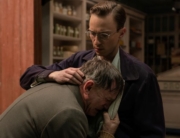Based on a collection of short stories penned by the ubiquitous James Franco, Palo Alto barks up the same tween tree that “indie“ Hollywood has been climbing for years. Titles such as The Bling Ring, Spring Breakers, Kids, and The Virgin Suicides all come to mind. This incarnation is likewise a dreamy look into the mundane world of pubescent suburban life.
The protagonists are teenagers attempting to navigate that infuriating space which provides them with adequate knowledge of—and desire for—the exact things they are denied. The film centers around four main characters: best friends Teddy (Jack Kilmer) and Fred (Nat Wolff), whose relationship is an unlikely one given Teddy’s sensitive nature and Fred’s nightmarishly self-destructive one.
On the female side of the spectrum, there is April (Emma Roberts), a virginal over-achiever who volleys between her schoolgirl crush on Teddy and a taboo attraction to her soccer coach (James Franco). Emily (Zoe Levin) conversely embodies the archetype of the village bicycle, doling out blowjobs like floss at a dentist’s office—no appointment necessary.
For the most part, the film follows each high schooler individually, only sometimes allowing their lives to intersect. The most often coupled characters are Teddy and Fred, who partake in your run-of-the-mill teenage-boy behavior: drinking, smoking weed, vandalizing, crashing their cars, and hooking up with girls.
Meanwhile, April and Teddy struggle to confess their affection for one another, and Emily and Fred partake in on-and-off sexual encounters. Each character seems to be under an invisible pressure, though none that exceeds the normal weight of privileged teenage dilemmas.
Overall, this is the kind of film in need of a breakdown of what did and did not work:
1) The kids are great actors.
Whoever cast this movie knew what they were doing. Both Levin and Roberts play their parts with subtlety and are believable as teenagers you’ve either known or been. Their set of heckling she-devil friends behaves in ways that assert their age and vapid nature to a tee: commenting on each other’s tits and holding cigarettes in that way young girls do to look more mature.
Jack Kilmer’s Teddy is also convincing. He’s artistic, soft-spoken, and a loyal friend, and each of these traits are delivered with restraint. I would argue that he is a bit too good-looking and well dressed to come off as awkward as his character is supposed to be, but this is a minor detail. You can’t blame a Coppola (here Gia, making her feature debut) for wanting her main character to appear as if primed for a Paper Magazine spread.
Though out of all the kids, Nat Wolff takes the proverbial cake, in part because he looks like an actual teenager. He’s gangly, odd, and not all that conventionally attractive. His Fred glides by purely on devilish charisma. We’ve all had this friend: the one whose explosive irreverence masks a frightened core. The only issue I found with his character was the lack of motivation for his behavior outside of hormones.
The audience is given no clue to decode his reasoning, rational or irrational. There is a patch of dialogue that hints at closeted homosexuality, as well as a brief scene depicting his pot-smoking father, who comes on to Teddy. A little more information would have enriched Fred’s already complex character. At present, he seems a bit too much like a stereotypical “bad kid” with none of the down of human circumstance to cushion his rough edges.
2) Little moments
There are specific instances that are particularly well thought-out and executed, and they happen to be the most microscopic ones. Many of them revolve around the love that April and Teddy share for one another, even though they refuse to discuss it.
3) Character portrayals
The minor adult characters are hilariously on-point. From their wardrobes to dialogue and surroundings, they are comically incompetent and out of touch. The guidance counselor, the art teacher, and the eternally youthful absentee parents all seem to live lives frighteningly separate from the kids they are responsible for. Jacqui Getty plays April’s mother all too well in her California-cool-mom uniform: a cami, leggings, and injected lips that cradle an e-cigarette.
The star of these bit parts is undoubtedly Val Kilmer, who plays April’s erudite, stoner/writer stepdad Stewart. We greet him through a puff of smoke as he is swathed in a terry cloth bathrobe, speaking in a slightly British accent, the kind born of pretentiousness rather than geographical origin. Grand Theft Auto is paused in the background, and his office boasts such hilarious artifacts as a coffee mug with his own top-knotted head printed on it. It’s the kind of cameo appearance that is as potent and enjoyable as Tim Robbins’s patchouli-drenched Ian in High Fidelity: everybody has met this asshole.
So now that I’ve surrendered the enjoyable bits, I must divulge the less successful ones:
1) From the lips of the tragically hip
There are moments throughout the film when it seems that Franco and Coppola are attempting to flex their intellect for the crowd. Their teenagers are cool and smart and they want everybody to know it. In the opening sequence, Fred is asking Teddy a hypothetical question about time travel. “That’s Aristotle shit,” he blurts in response to Teddy’s answer. I don’t care where you went to school—this phrase is high on the list of “Things teenagers do not say.”
2) An unrelenting, sentimental score
On the less irritating side, the music of Blood Orange narrates the film. It is fitting, yet an overbearing reminder that the film is, don’t worry, so cool. It lends a quality that made it seem like a music video, as my friend put it.
On the worse side, the music is melodramatic and heavy-handed. It is constant and suffocating, as if the film won’t allow you to form your own emotional reaction to any particular scene. There are so many moments that could have been humorous, wry, or ambiguous, but were instead drowned with nostalgic, sentimental isn’t-youth-so-tragic-yet-precious music. In few cases it was fitting, in others it was clichéd, and in the rest it was just dumb. An emotional ballad while kids are talking about cum faces? Sweeping music to the rhythm of an adolescent blowjob? Really?
3) Six degrees of nepotism
So we have Gia Coppola, the freshest heiress to her family’s movie dynasty; Emma Roberts, the niece of Julia Roberts; and Jack Kilmer, who is Val Kilmer’s son. But wait, there’s more. Jacqui Getty, who plays April’s mother, is, in fact, Gia Coppola’s mother, and the ex-wife of billionaire Peter Getty. Even Nat Wolff comes from a showbiz bloodline, though his parents are not household names per se.
Does this affect the formal quality of the film in a negative way? No. However, not discussing it seems disrespectful to the filmmakers and actors who have to work and move forward from the ground up. There is monopoly and nepotism in most industries, but the kind going on in this film more closely resembles incest.
There are other tidbits of the film that could fall under scrutiny: the lack of originality in the storyline, Franco’s mediocre performance, and the film’s similarity to Aunt Sofia’s work (there is even a Virgin Suicides poster on April’s bedroom wall), but these seem less worthy of analysis.
Palo Alto was enjoyable and well acted. Is it one of the best movies made about American high school life, as it has been described by one critic?
No. Absolutely not.







Leave A Comment